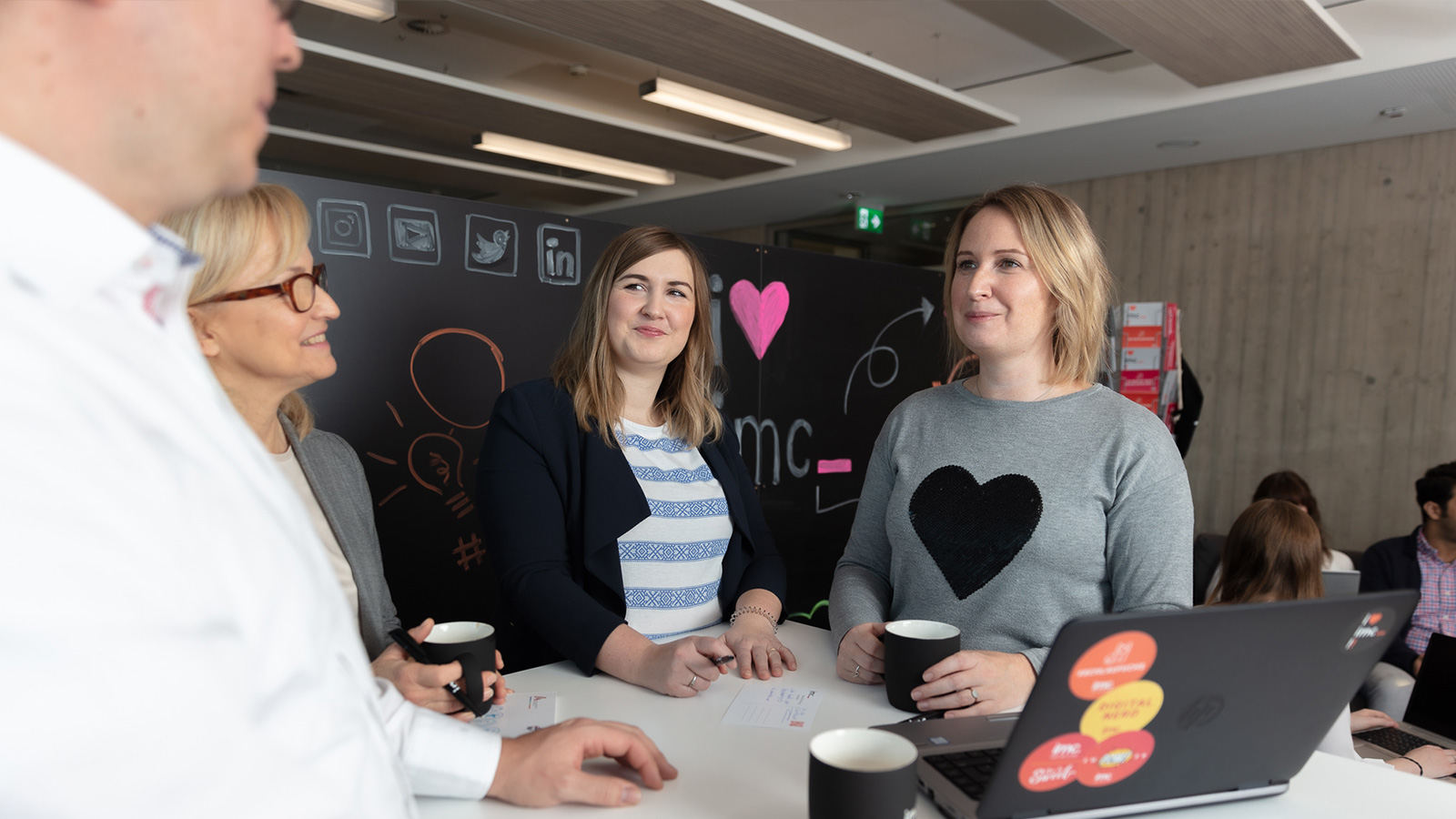
“The users decide whether or not a learning offer is successful”
It’s all about the people: Why introducing a learning management system is more than just getting another software.
“When companies introduce a learning management system, they need to understand that it is more than just another software. The objective must be to help people master the tasks they face in their job,” says Uwe Hofschröer, Head of the Learning Strategy Consulting Team at imc. In this role, he offers companies holistic advice on all aspects of digital learning.
He strives to place the employees at the heart of the offer, rather than the system or learning content. In this Job Slot interview, he also shares how he arrived at this job, and why he might as well be a note pad.

Uwe Hofschröer
Job | Head of Learning Strategy Consulting
Working in | Essen, Germany
Worked at imc since | 2017
Super power | Virtually interested in everything
Favourite food | Apple cake

Hello Uwe! Your job title sounds a bit like buzzword bingo. What exactly is it about?
The job title is rather abstract because it covers a broad spectrum of topics and tasks. The basic idea of learning strategy consulting is that we support customers whenever they face a more complex issue. Rather than offering advice on the introduction of a learning management system (LMS) or the key aspects of content development, learning strategy consulting focuses on the development of a holistic learning offer.
This is particularly relevant for companies making a fresh start with their digital learning offer and companies with little experience in this field. We help them consider all aspects and create a framework. Even larger companies will face new issues from time to time, and we then help them address these.
Can you give us a specific example for topics you get involved in?
Digital onboarding would be “our thing.” It is a fairly new topic for many companies. Of course, you can hire a concept designer to create a training course for you. The difference is that we are looking at the learner experience as a whole, rather than just the training course itself.
The learners are at the heart of the offer, and we need to start by identifying their needs. What content do they need? Which learning formats are suitable? How do these need to be designed? Next, we naturally examine how the training can be embedded in the LMS: How do we integrate it into the learning paths? How is the training presented? What interface does the learner see?
We are not restricting our evaluation to the content or the LMS but consider the entire learning journey. In a nutshell, learning strategy consulting covers traditional consultancy and needs assessments, analysis, and concepts design. We often support client projects for longer periods, coordinate the implementation or act as sparring partners.

Is your offer geared towards medium-sized companies or major corporations?
It’s not really clear-cut like that. Naturally, many SMEs never paid much attention to digital learning in the past and are keen to catch up now. Corona has certainly given many a big push in that direction.
However, many big corporations with a considerable track record in corporate learning and entire departments dedicated to learning and development are trying to move on from their focus on traditional face-to-face training. They might have employed the odd web-based training course, but now realise that this entire field is changing.
They will often lack experience or expertise in switching to hybrid or digital concepts and integrating them in a meaningful way. It’s also worth noting that attitudes towards proofs of learning success are changing.
The learning status “completed” only means that the learner has completed the training course. It offers no indication of whether the learner actually understood the contents or whether it will help them in their daily work.

How do you get a job like yours? What is your professional background?
Initially, I studied social sciences, aiming to do something in the field of journalism. However, I quickly realised that I’m not really cut out for that and took various courses in other fields as part of my degree. That also included technology, sociology and business management. In the early 2000s, I joined a research team examining what was a revolutionary subject back then: How universities can leverage the internet.
You could say that was my first venture into the world of digital learning, even if that term did not yet exist at the time. After this project, I took on a job as a concept designer with a professional development agency, where I initially created online and sales training, as well as early software training. After some time, I was given accounts that required me to support digital handbooks for car dealers. This gave me an insight into software projects and concept creation for learning platforms. I also learned how these platforms and courses are rolled out in large companies. It was a great learning experience.
Then, I joined imc. My background – especially the experience and insights gained with various customers and projects – helps me a lot in my current role.
I have to say that seven – or even five – years ago, I would never have thought that a job like this would exist. Back then, the professional development design and strategy was very much a company’s inhouse competence. However, the demand for multi-faceted consultations is increasing rapidly, not only for technological issues. The entire field of learning and development is quickly gaining ground – and complexity. It is difficult for companies to cover all the relevant aspects.

What do you especially like about your job?
It is always exciting and full of surprises. Each project and each set of customer requirements is different. There is very little routine. You need to engage with the customer and be tactful to find out what they need.
It also works in my favour that the job is very generalist in nature. I’m not a subject-matter expert. I know a lot of things in many fields, and somehow need to bring those pieces of knowledge together. All the different aspects – technical details of the LMS, different learning formats, change management processes – impact the learning culture as well as the corporate culture. We bring them together.
One thing that is extremely important to me, and I always try to convey to our customers is this: Neither a system nor a specific training course are at the heart of corporate learning. It is about the people. Employees want or need to learn something to do their job better. Their needs must therefore be a top priority.
After all, only the users decide whether a learning offer is a success or a failure. If they don’t see something that helps them, the offer is wasted.

That’s an interesting take! Now, I have some random questions for you. Ready? What is the most unusual thing you experienced in your job?
I found myself in a rather odd situation shortly before I joined imc. I was still working for my previous employer but had already handed in my notice and signed my contract with imc. My boss was aware of that, but the customer we had a meeting with that day had no idea. The purpose of the meeting? Helping them choose an LMS. Various providers pitched their solutions, including Sven R. Becker who is now on the imc Executive Board, but was Head of Sales at the time. While we both knew, the customer was unaware of my upcoming change of employer. Fortunately, the customer had to use a different tender procedure, so I was “off the hook” and did not have to make a recommendation on which system to choose.
Please complete this sentence: When dealing with colleagues, what matters the most is ...
... lots of communication, creating as much clarity and transparency as possible. While not always easy in practice, I also think a degree of composure, a reasonably relaxed attitude is important. We are all human. Mistakes happen and there has to be room for that. It’s OK. It’s part of the learning process.

What do you think your colleagues appreciate about you?
I would say my candour and my rather positive mindset.
If you could choose again, would you still decide on the same job?
Yes. It offers variety, is challenging and puts me in touch with many interesting people.
Sweet or savoury?
Savoury. I love my peanut puffs.
If you were an office supply, what would you be? Why?
I would likely be a note pad because it is extremely versatile. Note pads are also a great reminder that it’s worth keeping duplicates and older things. The mere existence of digital equivalents need not mean that they are better.
Thanks for the great insights, Uwe and all the best furthermore!

The crazy tech guy who wanted to be a Formula 1 driver
A little crazy, but also desperately in love with the LMS: That's Ravi Tandon, Customer Success Manager at imc Australia. He tells why he made the LMS his girlfriend and why he didn't become a Formula 1 driver.

Conductors of the Software Orchestra
The conductors of software and heroes behind the scenes: That's what product managers actually are. Like Lia Ghita from Sibiu, who as product manager is jointly responsible for imc's main product, the imc Learning Suite.
Would you like to know more about imc as an employer? Then take a look at our career section, maybe there is a suitable position for you.
We are also always happy to receive unsolicited applications!
